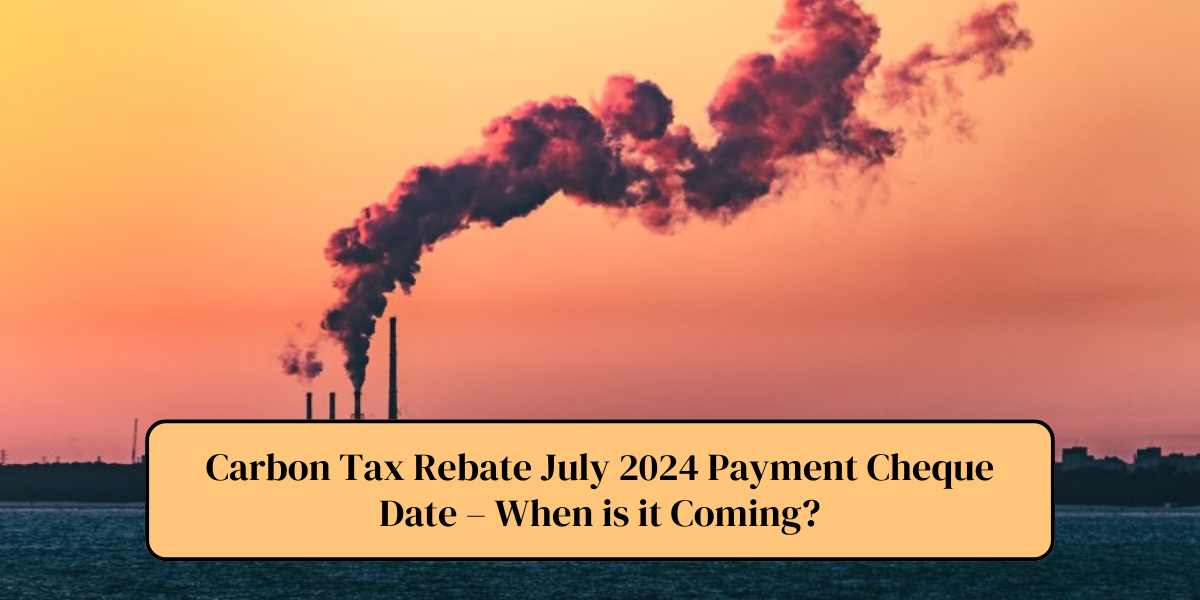This article covers every detail about the Carbon Tax Rebate 2024, including cheque dates and payment dates, and informs you when you can expect it. Keep scrolling to learn how much rebate you might receive if you pay the carbon tax in Canada.
Contents
Carbon Tax Rebate 2024
The Carbon Tax, also known as the Fuel Charge in Canada, is applied as a regulatory fee or tax on the carbon content of fuels at various government levels—provincial, territorial, or federal. As of 2023, the minimum tax is set at CA$65 per tonne of CO2 equivalent, increasing to CA$170 by 2030. The Canadian Revenue Agency is set to ease the burden of this tax for residents of New Brunswick, Ontario, Alberta, Saskatchewan, and Manitoba through the Carbon Tax Rebate 2024.
Residents of these provinces are eligible for the Carbon Tax rebate, which is distributed in four equal installments. This tax-free amount helps qualified taxpayers offset the cost of federal pollution pricing. The rebate includes a basic amount and an additional amount for those in small and rural communities.
Carbon Tax Rebate Cheque Dates 2024
The Canadian government has adjusted the payment method for the carbon tax rebate, officially known as the Climate Action Incentive Payment (CAIP). Previously claimed annually on personal income tax returns, the rebate is now provided as quarterly tax-free payments, effective from July 2022.
Residents of Newfoundland and Labrador, Prince Edward Island, and Nova Scotia receive their federal fuel charge rebate in three equal installments in the first year, followed by four quarterly payments starting from July 1, 2023.
Carbon Tax Rebate Payments 2024: How Much to Expect?
The rebate amount varies based on family circumstances and location. The payment is universal and not subject to deductions based on adjusted family income. Below is a table showing the Climate Action Incentive Payment (CAIP) for the base year 2022.
| Province | Individual | Couple | Per Child Under 19 | First Child in a Single-Parent Family |
|---|---|---|---|---|
| Ontario | $488 | $244 | $122 | $244 |
| Alberta | $772 | $386 | $193 | $386 |
| Saskatchewan | $680 | $340 | $170 | $340 |
| Manitoba | $528 | $264 | $132 | $264 |
| Nova Scotia | $124 | $62 | $31 | $62 |
| New Brunswick | $92 | $46 | $23 | $46 |
| Newfoundland and Labrador | $164 | $82 | $41 | $82 |
| Prince Edward Island | $120 | $60 | $30 | $60 |
Note: The October payment for New Brunswick residents is a double payment covering July to September 2023 and October to December 2023.
To be eligible for a retroactive payment for the 2022 base year, residents of small and rural regions must respond to the 2022 rural supplement question on their 2023 income tax and benefit return. Moreover, rural people in other provinces will receive the 10% rural extra, which is not displayed for Nova Scotia, Newfoundland, or Labrador.
When will the carbon tax rebate be paid?
Eligible residents of the specified provinces will receive their Carbon Tax Rebate 2024 in April, July, October, and January on the 15th of each month. In the event that the 15th falls on a federal holiday or weekend, the payment will be processed on the final working day prior to the 15th.
For example, this year, October 15 falls on a Sunday, so the CAIP will likely be disbursed on Monday. If you opted for direct deposit, the rebate will be deposited directly into your account. However, if you owe tax debts to the Canada Revenue Agency, the rebate amount will be adjusted against your outstanding balances.
Eligible citizens are advised to wait at least ten days after the CAIP disbursement date if they do not receive their payment. For assistance, you can call 1-888-863-8662 for benefit debt or 1-888-863-8657 for tax return debt.
How Do I Know If I Am Eligible for Carbon Tax Rebate?
Determining eligibility for the CAIP is straightforward. If you are a Canadian resident for income tax purposes at the start of the month when the CRA makes the payment, you qualify for the rebate. You must be at least 19 years old before the CRA makes the four installment payments. If under 19, you must meet one of the following conditions:
- Married or had a spouse previously.
- Currently or previously a parent living with your child.
For more information on the Carbon Tax Rebate, please check our other articles.
